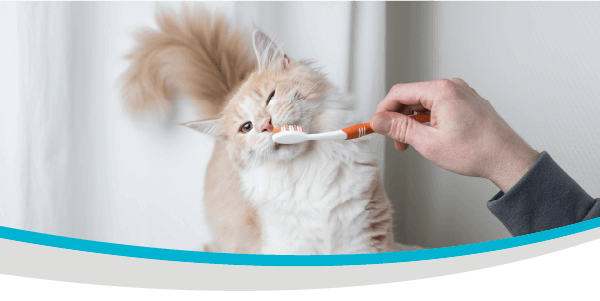Six Tips for Brushing Success
- Get comfortable. Kneel or sit in front of your pet instead of standing over him.
- Practice lifting your pet’s lip and reward with praise.
- Use toothpaste made for pets. Human toothpaste might hurt your pet’s stomach.
- Go slow. Start with rubbing your pet’s gums with your finger and letting them lick some of the toothpaste off the brush.
- Brush gently and start with short sessions. Increase the length each time you do it. Give lots of praise!
- Be patient—it may take several tries for your pet to get used to brushing.
If you haven’t taken a peek at your pet’s teeth lately, you might want to lift the lip and have a look.
Why? Because just like humans, when pets don’t get regular dental care, it can be a mouthful of trouble—we’ve seen it firsthand.
It’s not just about bad breath: left untreated, periodontal (dental) disease causes gum infections, tooth loss, problems eating, and severe pain. At later stages, bacteria can travel to internal organs and cause serious illness.
February is Pet Dental Health Month and if you have a dog or cat over three, chances are they already have some signs of periodontal disease.
But there’s a lot you can do to prevent more serious dental problems. First, schedule your pet for an exam where we can quickly assess the condition of your pet’s mouth and schedule your pet for a dental cleaning.
While you’re here, a member of our team will be happy to show you how to brush your pet’s teeth, which helps prevent heavy plaque and tartar build-up. It may also mean less frequent cleanings.
Have a pet that’s less than cooperative about tooth-brushing? That’s ok—we offer a wide variety of products in our hospital and our online pharmacy that can help keep your pet’s mouth healthier between dentals. Some great options for keeping your pet’s teeth clean include Oravet Dental Chews, CET Enzymatic Chews, and OxyFresh Water additives. We can even recommend prescription dental care diets to reduce plaque, stains, and tartar buildup.
Don’t wait if you think your pet may have a dental issue, because by the time you see symptoms, your friend has likely been suffering for a while. To make an appointment, click here or give us a call at (425) 823-8411!
